Hello, dear pet lovers!
Today, we delve into the world of “friendly” bacteria—probiotics. While it was once commonly believed that bacteria in the human body outnumber our cells by a ratio of 10:1, recent research suggests this number is closer to equal. Regardless, one thing is certain: our bodies, and those of our canine companions, host a vast and intricate bacterial ecosystem. Most of these microorganisms reside in the gut, with the majority being harmless or even beneficial, while only a small fraction can cause disease. For dogs, probiotics offer a myriad of advantages, including improved digestion, enhanced immune function, and a reduced risk of various health conditions, all contributing significantly to overall dogs gut health.
We’ve crafted this veterinary-backed guide to help you confidently navigate the options and choose the Best Probiotics For Dogs Gut Health with ease! For dogs experiencing joint discomfort, understanding the benefits of oils for dogs with arthritis can also be a valuable part of their care regimen.
What Are Probiotics for Dogs?
Dog probiotics are specialized supplements containing beneficial live microorganisms that help maintain a healthy balance of bacteria in the canine digestive tract. These good bacteria are crucial for optimizing overall digestive processes and bolstering the immune system.
It’s important to distinguish probiotics from related terms like prebiotics and postbiotics. Prebiotics are non-digestible fibers that act as food for these beneficial bacteria, stimulating their growth and activity. Postbiotics, on the other hand, are health-promoting compounds produced when probiotics ferment prebiotics. Another definition of postbiotics includes dead or inactivated probiotic cells that still confer health benefits through their interaction with the gut. Together, prebiotics, probiotics, and postbiotics form a synergistic trio that can significantly enhance overall canine health and well-being.
While beneficial bacteria naturally reside in the digestive tract, their delicate balance can be easily disrupted when dogs are sick or stressed. This imbalance often leads to various gastrointestinal issues such as diarrhea, excessive gas, and even bad breath. Beyond digestive concerns, research indicates that certain bacterial populations are found in higher quantities in obese and overweight dogs, while others may contribute to managing renal issues. The gut microbiota’s influence extends far beyond mere digestion, playing a pivotal role in the animal’s holistic health.
Probiotics for dogs are available in diverse forms, including palatable chews, convenient liquids, easy-to-mix powders, and capsules. They can also be found in probiotic-rich foods and natural sources such as yogurt and kefir. A critical factor to remember is the impact of environmental conditions: heat and humidity can significantly compromise the viability of probiotics. Higher temperatures and moisture levels drastically increase the risk of bacterial degradation, leading to a substantial decrease in their living population over time. This is why, at Dog Care Story, we often recommend powder forms, as their dry nature helps preserve the stability and potency of the probiotics.
When to Give Probiotics to Your Dog for Optimal Gut Health?
 Dog receiving a probiotic supplement mixed with food
Dog receiving a probiotic supplement mixed with food
Alt text: A dog eagerly eating food mixed with a probiotic supplement, demonstrating when to give probiotics for better gut health.
Probiotic supplementation can be beneficial for dogs across their lifespan, even when they appear to be in perfect health. However, their advantages become particularly pronounced during specific circumstances that can disrupt the delicate balance of their gut microbiome. When pets are ill or experiencing stress, their microbial balance can be severely compromised, making probiotics especially helpful. They are also highly advantageous during dietary transitions, as dogs age, when prescribed medications (especially antibiotics), and in cases of parasitic infections.
Probiotics offer a wide range of benefits for dogs, whether they are generally healthy or facing specific challenges. Here’s a detailed look at situations where they are most applicable:
- Diarrhea and Gut Health Disorders: Probiotics for dogs are widely recognized and extensively studied for their effectiveness in treating diarrhea and other gastrointestinal issues. They are frequently used in the management of inflammatory bowel disease (IBD). For example, research demonstrates that specific probiotic strains can be highly effective in mitigating antibiotic-associated diarrhea (AAD) caused by bacteria like Clostridium difficile.
- Dental Health: Surprisingly, certain probiotic strains have shown promise in reducing dental plaque accumulation and contributing to improved overall oral hygiene, which is often linked to gut health.
Probiotics for Antibiotic-Associated Diarrhea (AAD)
 Dog resting with a worried expression, possibly experiencing digestive upset
Dog resting with a worried expression, possibly experiencing digestive upset
Alt text: A small, fluffy dog looking contemplative, illustrating the need for probiotics during antibiotic-associated diarrhea for canine gut health.
Clostridium difficile is a gram-positive, anaerobic bacterium known to cause various gastrointestinal infections in animals. Its overgrowth is a common culprit in antibiotic-associated diarrhea (AAD), a condition that arises when antibiotic treatments disturb the normal, healthy balance of the gut microbiota. Symptoms typically include watery diarrhea, lethargy, vomiting, and general stomach upset.
While veterinary treatment often involves specific antibiotics to address the C. difficile infection itself, incorporating probiotics can significantly support overall recovery. Probiotics help re-establish healthy gut flora, thereby alleviating symptoms and promoting a quicker return to normal digestive function.
Probiotics During Pregnancy
The importance of a healthy maternal gut extends to offspring, as evidenced by a study that investigated the impact of prebiotic and probiotic supplementation in pregnant Great Dane dogs. The study aimed to determine if supplementing with prebiotics (MOS and FOS) and probiotics (Enterococcus faecium and Lactobacillus acidophilus) could enhance the quality of colostrum. Colostrum, the crucial “first milk,” is rich in antibodies (IgG, IgM, and IgA) that provide vital passive immunity to newborn puppies, protecting them from infections during their vulnerable early weeks.
Twenty pregnant Great Dane dogs were divided into four groups: one control group received a standard diet, while the other three groups received the supplement for the last one, two, or four weeks of their pregnancy. Blood samples were taken at various intervals to monitor antibody levels, and colostrum was collected at birth to analyze its antibody content.
The results demonstrated that the group receiving supplementation for the full four weeks exhibited the highest levels of IgG, IgM, and IgA in their colostrum. This finding suggests a significant improvement in the immune support transferred to their puppies. The study strongly indicates that a four-week supplementation period is the most effective for boosting the immune properties of colostrum, underscoring the potential of probiotics for enhancing the health of both mother and offspring.
Disclaimer: While probiotics offer numerous benefits for dogs gut health, at Dog Care Story, we always emphasize the importance of consulting with a qualified veterinarian. Personalized advice is crucial before introducing any new supplement into your dog’s regimen, ensuring it aligns with their specific health needs.
How to Choose the Best Probiotics for Dogs Gut Health?
Selecting the ideal probiotic for your canine companion can feel overwhelming given the vast array of options. To help you make an informed decision for your dog’s optimal gut health, we’ve compiled key recommendations:
- Evaluate Health Target: If you’re uncertain about your dog’s specific health concerns, a consultation with your veterinarian is paramount. It’s crucial to select a probiotic formula specifically designed to address those conditions or to support a particular health goal. Keep in mind that probiotics are also highly beneficial for completely healthy pets, so a specific “problem” isn’t always a prerequisite.
- Scientific Studies: The efficacy of probiotics for dogs is best substantiated by robust scientific research. Prioritize products that feature strains with multiple supporting studies, as these are more likely to deliver effective results. Well-documented evidence for the included strains is a strong indicator of a product’s potential effectiveness.
- Choose Specific Strains: Look for probiotics that contain beneficial strains with proven efficacy for your dog’s specific health concerns. For general digestive health and promoting a balanced gut microbiome, commonly recommended strains include Enterococcus faecium NCIMB 30183 or NCIMB 10415, Saccharomyces cerevisiae boulardii, and various Bifidobacterium species. Additionally, Lactobacillus and Bacillus subtilis DSM 15544 can offer added benefits, with Bacillus often providing superior stability within formulations. Your veterinarian can offer invaluable guidance in identifying the most suitable strains for your dog’s unique needs.
- Brand with Veterinary Endorsement: While well-known brands that are supported or founded by veterinarians can sometimes be pricier, they often offer a higher degree of assurance regarding product quality and scientific backing. However, many quality alternatives exist. Always meticulously review the product’s label to ensure it adheres to high manufacturing standards and is appropriate for your dog.
- Find the Best Form for Your Dog: Probiotics come in various formats, including capsules, chewable tablets, liquids, and powders. For superior stability and more precise dosing of the delicate probiotic microorganisms, consider opting for a powder form. Powders typically have a lower moisture content, which is crucial for maintaining the viability of the probiotics over time and ensuring your dog receives the correct, active dosage.
- Choose a High Potency Probiotic: Colony-Forming Units (CFU) quantify the number of viable microorganisms in a probiotic product. While lower CFU counts might suffice for general health maintenance, higher CFUs are often recommended for addressing more serious illnesses. It’s vital to recognize that each probiotic strain may have its own optimal dosage. Therefore, selecting a product developed by a brand with veterinarians on its team and backed by studies for its specific strains is essential for guaranteeing correct dosage and maximum effectiveness for your dog’s individual requirements.
- Read Reviews: If you’re still undecided after considering the above factors, delving into customer reviews can provide valuable insights into the experiences of other pet owners. While individual results can vary, reviews offer practical perspectives that can help guide your final choice.
Note: Always consult with a veterinarian to gain a deeper understanding of bacterial strains, appropriate CFU counts, overall product quality, and your dog’s specific health needs before making a decision. This ensures you choose the best probiotics for dogs gut health tailored to their individual requirements.
Benefits of Probiotics for Dogs
 Close up of a dog with a happy expression, illustrating the positive effects of probiotics
Close up of a dog with a happy expression, illustrating the positive effects of probiotics
Alt text: A contented dog’s face, representing the wide-ranging benefits of probiotics for overall canine health and happiness.
Probiotics are beneficial microorganisms that exert a profound positive impact on a dog’s health. Here are some of the key benefits they offer for dogs gut health:
Improved Digestion and Nutrient Absorption: Better Overall Gut Health
Probiotics are instrumental in balancing the microbial population within the gut, which is fundamental for proper digestion. By ensuring that beneficial bacteria outnumber potentially harmful ones, probiotics facilitate the production of essential digestive enzymes and aid in the efficient breakdown of complex carbohydrates, proteins, and fats into smaller, more absorbable molecules.
Human studies indicate that Saccharomyces boulardii is an effective probiotic for treating both acute and chronic enteropathies. It’s important to note that Saccharomyces boulardii is a yeast, not a bacterium, but it is nonetheless classified as a probiotic due to its significant health-promoting effects.
Other probiotics that have demonstrated notable effectiveness include:
- Enterococcus faecium, particularly the strains Enterococcus faecium DSM 10663 NCIMB 10415.
- Bacillus subtilis, especially the strain Bacillus subtilis C-3102 Calsporin.
- L. acidophilus, with the strain L. acidophilus D2/CSL.
These specific strains have been clinically proven to provide significant benefits and should be considered based on your dog’s particular health requirements.
One study meticulously evaluated the effects of Saccharomyces cerevisaee boulardii in both healthy dogs and those suffering from chronic enteropathies (CE), meticulously monitoring for any adverse effects. The results strikingly demonstrated that Saccharomyces cerevisaee boulardii could offer superior control of clinical signs in dogs with CE when used in conjunction with standard therapy, compared to standard therapy alone.
While scientific evidence for probiotic use in dogs is still developing compared to human research, a study suggests that supplementation with Bifidobacterium animalis AHC7 can reduce the duration of diarrhea from seven to four days. Furthermore, the same study indicated that probiotics might decrease the necessity for antibiotic treatment by approximately 10 percent.
Again, it’s crucial to remember that not all probiotic strains possess the same benefits; thus, understanding their specific actions is key to choosing the best probiotics for dogs gut health.
Reduction in Allergies and Skin Conditions
Surprisingly, probiotics can also help with allergies, contributing to better skin health. They are thought to facilitate the production of regulatory T-cells, which play a crucial role in suppressing excessive immune reactions and preventing allergic responses. Additionally, probiotics can fortify the gut barrier, helping to prevent allergens and toxins from entering the bloodstream and triggering systemic reactions. To further support skin health, especially for specific conditions, exploring the best oils for dogs skin can also be beneficial.
Canine atopic dermatitis (CAD) is a prevalent, chronic inflammatory skin condition in dogs, characterized by an abnormal immune response involving IgE antibodies to common allergens. One study found that administering the probiotic strain Lactobacillus sakei probio-65 for two months significantly reduced the disease severity index in dogs diagnosed with CAD.
Another trial involved 11 dogs with atopic dermatitis to assess the impact of probiotics. The dogs were randomly divided into two groups: 7 dogs received Bifidobacterium longum probiotics, while a control group of 4 dogs received a placebo powder daily for 12 weeks. The severity of skin lesions was evaluated using the Canine Atopic Dermatitis Extent and Severity Index (CADESI)-4. While the promising results should be considered within the context of a relatively small sample size, the study showed a significant decrease in the CADESI-4 score in the probiotics group at 4, 8, and 12 weeks compared to their baseline scores, indicating effective improvement in skin lesions. This suggests that probiotics may be a beneficial therapeutic option for dogs with atopic dermatitis and severe skin symptoms.
Weight Support
Research, particularly human studies, has established that individuals with obesity often exhibit a distinctly different gut bacterial composition compared to lean individuals. This phenomenon is increasingly thought to apply to animals as well, highlighting the significant role gut bacteria play in influencing and regulating body weight.
Recent research on probiotics for obese canines specifically revealed that the administration of Enterococcus faecium IDCC 2102 and Bifidobacterium lactis IDCC 4301 effectively led to reductions in body weight, decreased lipid accumulation, and lowered systemic inflammation in canine models with high-fat diet-induced obesity. These specific probiotics were shown to improve gut microbiota balance and optimize metabolic processes, thereby enhancing energy utilization and helping to restore stable eating behavior and glucose tolerance in the dogs studied.
Renal Support
Beyond their well-known digestive benefits, probiotics are gaining recognition for their potential in supporting renal health. Human studies have indicated that probiotic supplementation can mitigate the severity of renal ischemia-reperfusion injuries and secondary liver damage. This suggests that probiotics may also offer beneficial effects for addressing kidney-related issues in dogs.
A specific probiotic formulation, Renadyl, was evaluated in patients with end-stage renal disease (ESRD) to assess its safety and efficacy. The primary objectives were to determine if Renadyl could improve quality of life or reduce levels of uremic toxins, while secondary objectives focused on biomarkers of inflammation and oxidative stress. This human study concluded that Renadyl was deemed safe for use, and observed trends indicated potential benefits, including reductions in inflammatory markers. These findings offer promising insights into the potential role of specific probiotics in supporting renal function and overall health in conditions where kidney support is crucial. For elderly dogs or those with age-related health concerns, it’s also worth investigating the best supplement for dog dementia to support their cognitive well-being.
Enhanced Immune System
Probiotics play a pivotal role in supporting a robust gut microbiome, which, in turn, profoundly influences the immune system. A healthy and balanced gut reduces the likelihood of infections and chronic inflammation, both of which can significantly weaken the body’s immune defenses.
In a comprehensive study involving 90 dogs, categorized into three distinct age groups—elderly (30 dogs), young (24 dogs), and training (36 dogs)—the impact of probiotics was thoroughly investigated. Each age group was further divided into two subgroups: one receiving a daily probiotic feed additive, and the other serving as a control. The probiotic additive contained three specific bacterial strains: Lactobacillus casei Zhang, Lactobacillus plantarum P-8, and Bifidobacterium animalis subsp. lactis V9.
The study yielded several significant findings regarding the effects of probiotics:
- Increased Feed Intake and Weight Gain: Across all age groups, dogs receiving probiotics demonstrated higher average daily feed intake and subsequently greater weight gain.
- Changes in Gut Microbial Structure in Elderly Dogs: Notably, elderly dogs exhibited significant alterations in their gut microbiota composition.
- Increased Beneficial Bacteria: There were observable increases in beneficial bacteria such as certain Lactobacillus species and Faecalibacterium prausnitzii.
- Decreased Potentially Harmful Bacteria: Conversely, there was a reduction in potentially harmful bacteria like Escherichia coli and Sutterella stercoricanisin.
- Significant Response in Elderly Dogs: Elderly dogs showed the most pronounced and evident response to probiotic supplementation.
- Correlation with Immune Factors: Changes in the relative abundance of some bacterial species were directly correlated with specific immune factors and physiological parameters.
- Overall Health Improvement: Probiotic treatment was associated with improved overall health and significantly enhanced immune health, likely achieved through the stimulation of antibody and cytokine secretion, regulated by the gut microbiota.
Remarkably, by day 60 of probiotic treatment, the gut microbiota of elderly dogs began to resemble that of younger dogs. These findings powerfully indicate that probiotics can positively impact canine health and significantly bolster the immune system, particularly in older dogs. This research also provides valuable insights for developing probiotic-based strategies to enhance both animal and human health.
Anxiety Alleviation
Clinical experience often reveals a strong link between canine anxiety and gastrointestinal issues. Some dogs are particularly prone to digestive upset when stressed, and even separation anxiety can manifest as nervous intestines and various other GI problems. Probiotics can play a crucial role in balancing the gut microbiota, which in turn promotes optimal digestive function. By fostering a healthier gut environment, probiotics may help alleviate anxiety-related gastrointestinal symptoms, contributing to a more comfortable and calm state for the dog. For dogs experiencing generalized anxiety or other behavioral challenges, exploring a holistic approach that includes nutritional support for their brain and body might be beneficial, such as considering the best supplement for dog dementia if age is a factor in their overall health.
Note: Always consult with a veterinarian before giving your dog probiotics specifically to address anxiety and related gastrointestinal issues. A professional diagnosis and tailored treatment plan are essential.
Precautions and Considerations for Probiotics for Dogs Gut Health
 A dog looking cautiously at a small tablet, symbolizing the need for caution with supplements
A dog looking cautiously at a small tablet, symbolizing the need for caution with supplements
Alt text: A careful dog observing a supplement, emphasizing precautions and considerations for introducing probiotics for canine gut health.
While probiotics are generally well-tolerated and considered safe for most dogs, pet owners should always exercise caution and diligence when introducing any new supplement into their pet’s routine.
Possible Side Effects: How to Monitor Them?
When introducing any new supplement or dietary change to your dog, meticulous monitoring of their response is crucial. Promptly addressing any observed side effects helps safeguard your dog’s well-being and ensures a positive outcome.
Although probiotics are primarily intended to support digestive health, they can sometimes paradoxically cause temporary digestive upset, including increased gas, bloating, diarrhea, or constipation, as the gut microbiome adjusts. If you observe any of these symptoms, especially if they are severe or persistent, contact your veterinarian as soon as possible. To minimize the risk of such initial side effects, it’s advisable to begin with a lower dose than recommended and gradually increase it over several days, allowing your dog’s system to acclimate.
Although rare, allergic reactions can occur. These may manifest as itching, redness of the skin, hives, or swelling. Should you notice any of these signs, discontinue the probiotic use immediately and seek veterinary attention without delay.
Tips to Prevent Side Effects:
- Introduce the supplement gradually over several days.
- Continuously monitor your dog’s behavior, appetite, stool consistency, and overall health.
- Adjust the dosage as needed, always consulting with a veterinarian if concerns arise.
Importance of Choosing High-Quality Probiotics
There’s no debate that high-quality products deliver the best results. However, discerning which probiotic product genuinely stands out can be challenging for the average pet owner.
Here at Dog Care Story, we define a high-quality product as one that consistently meets the following stringent criteria:
- Veterinarian or Nutritionist Formulated: Developed by a qualified veterinarian or an expert in pet nutrition, ensuring scientific grounding.
- Backed by Scientific Studies: All claims regarding efficacy must be supported by robust research. Without this evidence, the affirmations lack proof, making it impossible to ascertain if the chosen strain effectively supports your dog’s health needs.
- Correct Dosage: The product utilizes dosages that have been proven effective in scientific studies.
- Stability: Crucial for probiotics, which are living microorganisms whose potency naturally diminishes over time. The product should employ methods to ensure and extend the viability of its strains, with stability data available.
- Manufacturing Standards: Produced in facilities that adhere to strict quality controls, such as GMP-compliant (Good Manufacturing Practices) and NASC-approved (National Animal Supplement Council) facilities in the USA.
- Limited Inactive Ingredients: Contains a minimal amount of inactive ingredients, reducing the risk of unnecessary fillers or potential allergens.
- Third-Party Testing: Independently tested by a third party to verify the accurate quantities of active ingredients as listed on the label.
- Veterinarian Trust: Trusted and recommended by veterinary professionals, who are typically very discerning about the products they incorporate into their practice.
- Transparent Communication: The company is responsive and willing to answer all your questions regarding their product.
High-quality products are designed to provide maximum benefits while minimizing adverse effects, though it’s important to remember that individual reactions can still vary. Always read the label thoroughly to ensure purity, potency, and a proven shelf life for optimal effectiveness for your dogs gut health.
Consulting With a Veterinarian
Before embarking on any new supplement regimen for your dog, it is always advisable to consult with a qualified veterinarian. This crucial step ensures that you receive tailored recommendations based on your dog’s specific health profile, medical history, and individual needs.
While probiotics for dogs, though incredibly beneficial, may not always lead to a complete recovery from severe conditions, they can significantly enhance your dog’s overall health, particularly by optimizing digestive tract function and contributing to robust dogs gut health**. Furthermore, for specific conditions like arthritis, a veterinarian can also guide you on the most suitable foods to help dogs with arthritis in conjunction with probiotics.
Top 5 Best Probiotics For Dogs Gut Health
While scientific studies specifically on probiotics for dogs and their full range of efficacy are still limited compared to human research, the field is rapidly expanding. Veterinary professionals are actively exploring the benefits of various strains and incorporating them into numerous research initiatives.
Based on product quality, specific purpose, and extensive customer experiences and reviews, we’ve identified some of the best probiotics for dogs gut health available on the market. Let’s explore these top picks!
Best Probiotic With Clay for Dogs
Clay is often recommended for dogs experiencing gastrointestinal health issues due to its remarkable ability to absorb toxins and harmful substances. It also helps stabilize digestive function and provides a soothing effect on inflammation within the gut. Its natural properties are effective in managing diarrhea, improving stool consistency, and supplying essential minerals like calcium and magnesium.
Pro-Kolin Advanced for Dogs by Protextin
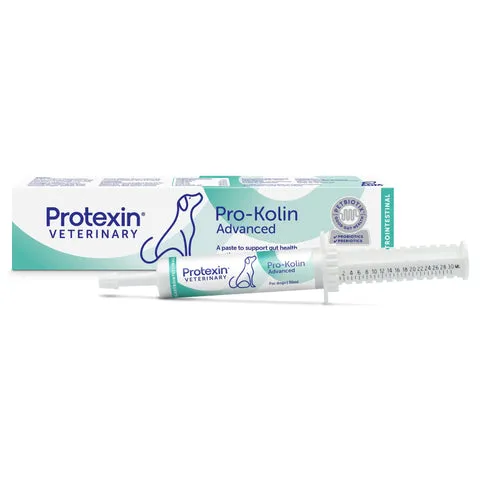 Pro-Kolin Advanced for Dogs by Protextin
Pro-Kolin Advanced for Dogs by Protextin
Alt text: Pro-Kolin Advanced for Dogs by Protextin packaging, a recommended probiotic for canine gut health.
Why trust it?
- This probiotic supplement features a comprehensive blend of beneficial microorganisms, prebiotics, soothing fibers, and a dual-source binding agent.
- It contains pectin, which helps soothe the gut lining, and psyllium, known for its ability to absorb excess water from the gastrointestinal tract, aiding in stool normalization.
- While the combination of ingredients can be highly effective, we note that a slightly simpler formulation might reduce the risk of potential allergies and adverse reactions in sensitive dogs.
- Its “Preplex” component includes two highly valued ingredients: FOS (fructooligosaccharides) and acacia gum, both excellent prebiotics that support probiotic function.
Full bucket Health Bioclay+ Paste
Alt text: Full Bucket Health Bioclay+ Paste, a probiotic clay supplement for dogs with digestive upset.
Why trust it?
- This paste boasts a bioactive clay-based formula specifically designed to promote digestive health during occasional distress and to support dogs gut health.
- It contains 1.56 Billion CFUs of Saccharomyces cerevisiae boulardii, a highly beneficial yeast strain of probiotic that is particularly safe and effective to use concurrently with antibiotic therapy. While not as extensively studied as some specific bacterial strains like Levucell®, Saccharomyces cerevisiae boulardii remains a valuable component for maintaining digestive balance and supporting gut health, especially during antibiotic treatment.
- It also includes L-Glutamine and bio-adsorbent clay, which work synergistically to support the removal of toxins from the digestive system.
Best Probiotics for Diarrhea in Dogs
These probiotics are specifically recommended for dogs that frequently suffer from episodes of diarrhea, offering targeted support for their dogs gut health. You can learn more in-depth about the Probiotics for Dogs With Diarrhea here.
Protexin Synbiotic D-C
Alt text: Protexin Synbiotic D-C capsules, a top-rated probiotic for managing diarrhea in dogs.
Why trust it?
- It contains Enterococcus faecium (DSM 10663/ NCIMB 10415) 4b1707, a highly effective strain that aids in repopulating the intestine with beneficial microorganisms crucial for dogs gut health. At Dog Care Story, this is one of our preferred probiotic strains for comprehensive gut support.
- It offers a synbiotic action, combining probiotics and prebiotics in a very effective blend without any harmful additional ingredients.
- The product is delivered in powder form within capsules, ensuring greater stability and viability of the probiotic cultures.
Protexin is consistently one of our most recommended brands for its targeted, gut-beneficial probiotic solutions.
Purina Fortiflora Synbiotic
Alt text: Purina Fortiflora Synbiotic probiotic supplement sachets for dogs, vet-recommended for gut health.
Why trust it?
- This product is recognized as the number one veterinarian-recommended dog probiotic brand for digestive health (Kantar Veterinary Tracker, 2021).
- It is available as a convenient probiotic powder supplement, suitable for both puppies and adult dogs, making it a versatile choice for supporting dogs gut health across different life stages.
- It offers a powerful synbiotic action, blending prebiotics and probiotics to effectively manage diarrhea and foster a healthy microflora.
- This probiotic supplement includes psyllium, which is known to stimulate the growth of beneficial Lactobacillus and Bifidobacterium species. While psyllium is indeed beneficial, we would ideally like to see FOS (fructooligosaccharides) also included, as it is a highly effective prebiotic that synergizes exceptionally well with these beneficial bacteria.
Proviable Forte
Alt text: Proviable Forte sprinkle capsules for dogs, a multi-strain probiotic for intestinal balance.
Why trust it?
- Each capsule delivers a potent 10 billion CFUs and features 7 distinct strains of bacteria specifically chosen to improve intestinal balance and support overall dogs gut health. It provides a diverse range of good bacteria, but it’s worth noting that not all included strains have demonstrated consistent efficacy in studies, which may raise questions about the necessity and effectiveness of such a broad spectrum.
- It also contains prebiotics designed to encourage the growth of beneficial gut bacteria, although the overall effectiveness of these specific prebiotics may vary. We would prefer to see FOS (fructooligosaccharides), a highly effective prebiotic renowned for its proven benefits in supporting the growth of healthy gut bacteria.
- The contents of each capsule can be easily sprinkled over your dog’s food, making administration simple and stress-free.
Best Maintenance Probiotics for Dogs
The following product is a unique blend designed for daily administration, even to healthy dogs, to proactively maintain optimal dogs gut health. It’s important to note that the probiotics previously mentioned for diarrhea are also excellent candidates for regular maintenance, depending on your dog’s specific needs.
Animal Biome GI Relief
Alt text: Animal Biome GI Relief probiotic supplement for dogs, featuring a blend of phages, prebiotics, and probiotics.
Why trust it?
- This product offers a triple and unique blend, combining phages (PreForPro), prebiotics (FOS), and probiotics (S. boulardii), providing comprehensive support for dogs gut health.
- It is produced by a renowned company highly trusted by many veterinarians, recognized for their expertise in fecal microbiota transplant products and advanced gut health solutions.
- According to the manufacturers, this blend is effective in reducing diarrhea caused by antibiotics, C. difficile, or E.coli, addressing common causes of digestive upset.
- It includes S. boulardii. While this strain may not be as specifically studied as some others, it is widely recognized and considered beneficial for overall gut health maintenance.
Read More: Delve deeper into prebiotic supplements like FOS and Inulin to further enhance your understanding of their role in supporting dogs gut health.
Best Probiotic for Dog Kidneys
The following probiotic is specifically formulated and highly recommended for dogs facing renal issues, offering targeted support for their kidney health alongside their dogs gut health.
Azodyl
Alt text: Azodyl small capsules, a specialized probiotic for dogs with kidney issues.
Why trust it?
- Azodyl is designed to help manage uremic toxins, with studies indicating improvements in BUN (blood urea nitrogen) and creatinine levels within a four-week period, showcasing its benefits for renal health.
- It contains specific bacterial strains known to thrive in the uremic environment, including Streptococcus thermophilus KB19, Lactobacillus acidophilus KB27, and Bifidobacterium longum KB31, which work to metabolize toxins.
- This probiotic is housed in an acid-resistant capsule, which is crucial for protecting the delicate bacteria from stomach acid until they reach the colon, ensuring their viability and effectiveness.
Conclusion
Probiotics are generally safe and exceptionally well-tolerated by pets, offering significant advantages for both healthy animals and those dealing with digestive issues or other health concerns. The primary benefits of these “friendly” microorganisms include dramatically improved gastrointestinal health and enhanced digestion, leading to overall better dogs gut health. Beyond digestive support, probiotics can also play a vital role in alleviating allergic reactions, aiding in weight balance, boosting immune system function, and potentially helping with anxiety alleviation.
What positive changes or benefits have you observed in your dog since starting them on probiotics? We’re eager to hear your experiences—please share them with us in the comments section below!
FAQ
What are the benefits of probiotics for dogs?
Probiotics are beneficial bacteria that significantly support your dog’s gut health. However, not all probiotics are created equal. It’s essential to look at their specific name, like Enterococcus faecium, and their particular strain, such as Enterococcus faecium NCIMB 10415. When you select the right ones, these targeted probiotics help maintain a balanced digestive system, reduce instances of diarrhea, improve stool quality, enhance nutrient absorption, and even strengthen overall immune function, all contributing to optimal dogs gut health.
Can I give human probiotics to my dog?
It is generally not recommended to give human probiotics to your dog. Human probiotics are formulated specifically for the human digestive tract and may not contain the appropriate species-specific strains or concentrations that are beneficial for dogs. This is why it’s crucial to look at the bacterial name and their specific strain. Dogs require species-specific probiotic strains, such as Enterococcus faecium NCIMB 10415, which are scientifically proven to benefit canine digestion and overall dogs gut health. Always choose a probiotic supplement that has been specifically formulated and tested for veterinary use.
Are probiotics safe for dogs with sensitive stomachs?
Yes, when the right strains are selected and introduced correctly, probiotics are often highly beneficial for dogs with sensitive stomachs. They can help reduce common symptoms like bloating, gas, and irregular stools by rebalancing the gut microbiome. For sensitive stomachs, look for supplements that combine probiotics with prebiotics (like FOS), as this synergistic approach can gently encourage the healthy growth of beneficial gut bacteria, leading to improved dogs gut health without causing further irritation.
How do I know if a probiotic is working for my dog?
To determine if a probiotic is effectively supporting your dog’s gut health, it’s crucial to first examine the scientific studies conducted for that specific probiotic strain. Once you begin administration, consistency and diligent tracking of results are key. Here are important steps and signs to look out for:
Track Changes in Stool Quality: The most immediate indicator that a probiotic is working is an improvement in your dog’s stool. This includes:
- Firmness: Softer or watery stools should gradually firm up over time.
- Odor: A noticeable reduction in foul-smelling stools can signal improved digestive health and breakdown of waste products.
- Frequency: Regular and well-formed bowel movements suggest more efficient digestion.
Monitor Digestion and Appetite: Probiotics help balance gut bacteria, which can lead to:
- Less Gas and Bloating: If your dog’s stomach appears less distended, or they stop excessively passing gas, these are positive signs of improved digestion.
- Better Appetite: An effective probiotic will often lead to your dog showing more interest in meals or maintaining a healthier, more consistent feeding routine.
Observe Behavior and Energy Levels: Given the strong link between gut health and overall well-being:
- Increased Energy: A happy, healthy gut can significantly contribute to your dog feeling more energetic, playful, and active.
- Less Lethargy: Dogs with improved digestion often exhibit less fatigue or sluggishness, indicating a better absorption of nutrients and overall vitality.
Give it Time: Be patient and consistent with probiotic administration, as it can take several days to a few weeks to observe noticeable improvements. Your dog’s unique microbiome requires time to adjust to the new balance of bacteria. Ensure you are administering the correct dosage daily and carefully tracking any subtle changes in your dog’s health and behavior.
Author: Dr. Sandra
Doctor of Veterinary Medicine (DVM)
Meet Dr. Sandra, a Doctor of Veterinary Medicine (DVM). Sandra seamlessly combines her two passions—writing and veterinary medicine. Dedicated to animal welfare, she is actively conducting research aimed at solving the pressing issue of stray dog populations. In addition to her groundbreaking research, Sandra possesses valuable experience in the pharmaceutical industry and works as a respected veterinary advisor. Her primary objective is to empower pet parents with accurate, accessible information about dog health, effectively “translating” complex veterinary language into simple, easy-to-understand terms.
Join Dr. Sandra to learn more about pets and discover how simple, expert advice can significantly improve your dog’s life.
The content presented here is for informational purposes only and reflects Dr. Sandra’s own opinions, expertise, and experience. It is not intended to replace professional veterinary consultation, diagnosis, or treatment. For personalized advice and care for your pets, always consult with your veterinarian.
Education: 2016-2023 | Faculty of Veterinary Medicine – Skopje, Macedonia
Researches: (October 2023) “Model for identifying appropriate strategies for dog control population” (April 2019) “Comparative overview of stray dog control population between countries” (September 2018) “Influence of Dermanyssus Gallinae on animal health – One Health Approach” (May 2018) “Circadian behavioral rhythm of dairy cows in a loose housing system”

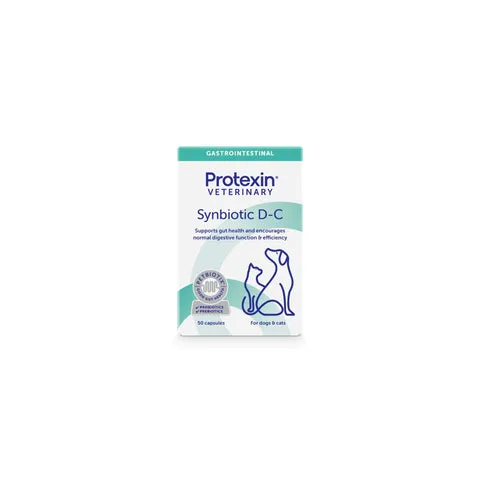 Protexin Synbiotic D-C
Protexin Synbiotic D-C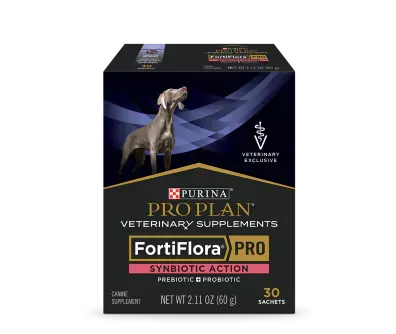 Purina Fortiflora Synbiotic
Purina Fortiflora Synbiotic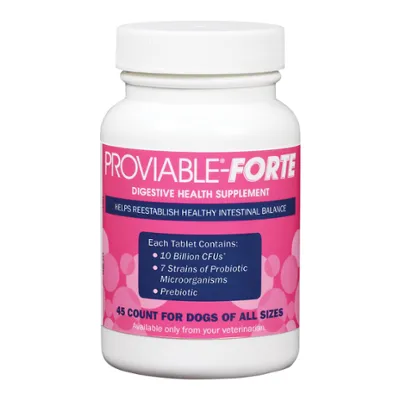 Proviable Forte
Proviable Forte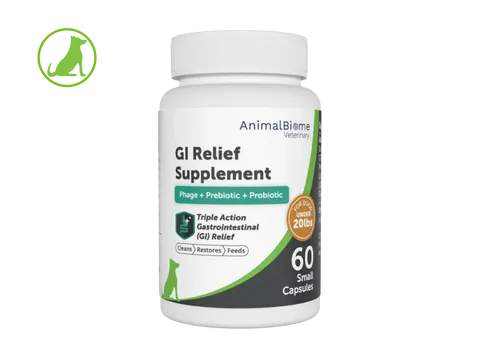 Animal Biome GI Relief
Animal Biome GI Relief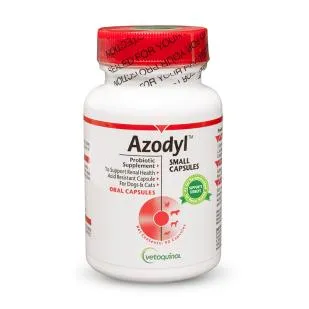 Azodyl
Azodyl